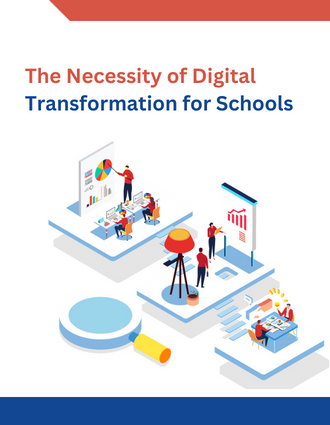The way we learn and teach has changed as a result of technological advancement, which is a fundamental tenet of society. One must now leverage the best ERP software for schools in the form of digital transformation if one wants to stay relevant and educate their students with increased efficiency.
With the COVID-19 pandemic forcing many schools to shift to remote learning, the need for digital transformation in education has become even more apparent. Today we will explore the importance of digital transformation in schools, the benefits it offers to students, teachers, and administrators, and the challenges that may arise during the implementation process. Let’s dig deep!
Digital Transformation in Education – A Brief Overview
Students, teachers, and other participants extensively benefit from digital transformation in the education sector. Through interactive and adaptable learning, these changes hope to boost accessibility and engagement.
The opportunities made possible by the ERP for school management in higher education include micro-lessons, interactive videos or tests, and even games or AI-based learning methodologies.
A student can engage in and actively participate in all of these options’ various parts or tasks. Thanks to technologies like text-to-speech and colourblind-friendly visualization, people with disabilities can now receive an education without any obstacles or difficulties.

How Does Digital Transformation Help The Education Sector?
1. Modular Learning
Schools, universities, and many brick-and-mortar institutions have stopped taking classroom classes after the pandemic. The majority of institutions now support digital education strategies.
The outcomes of learning, nevertheless, are often murky. Given that the Covid epidemic looks to be under control and that universities and schools are gradually starting to resume classes, parents are worried about whether they may take their children to school. This has forced educational institutions to accept the change of education through technology and switch to online coaching classes with the help of the best ERP software for schools.
2. Contactless Attendance
One example of how the education industry has been impacted by digital transformation is the introduction of contactless attendance systems. Initially, teachers manually recorded each student’s attendance in a register or on paper during class.
However, this approach had a number of drawbacks, including the possibility of mistakes and fraud, as well as the time needed to collect and process attendance data.
Contactless attendance systems, on the other hand, use advanced technologies in order to automate attendance tracking, making the process faster, more accurate, and more efficient.
With ERP software for schools, students can scan their ID cards or use facial recognition to mark their attendance without physical contact. This makes it a mere cakewalk for teachers and administrators to keep constant track of students’ attendance and identify patterns of absenteeism.
3. Learners Across The Globe
Digital learning platforms enable teachers to share their subject matter with audiences all over the world by literally removing regional and cultural barriers.
With the help of the best school ERP software, people from all over the world can participate and contribute to lessons, creating global conversations with so many various points of view on the same subject and resulting in a more enriching educational experience.
4. Customized Experience
Big data-driven course development and offering students individualized benefits are both essential for enabling extensive digital transformation in the education sector.
Big data is used by these systems to suggest relevant courses that will pique students’ interests and inform them of their possibilities of success. Identification of individual needs is made simpler, and progress is accelerated by the ability to tailor instruction to each student’s needs.
5. Improved Relations Between Parents and Teachers
According to studies, when parents are worried about their children’s academic progress, they perform better in school and are generally healthier. Automation encourages parents to pay their ward’s fees on time and easily provides them with progress and attendance data.
They are also less concerned about their child’s safety because they are continually informed if the youngster is abroad or on leave, and they can track the school bus from anywhere at any time. Consider the possibility that the program could give a valuable career counselling solution by providing work opportunities based on a student’s skills and shortcomings, as supported by measurable data.
6. Saves Extensive Time
In today’s fast-paced world, where time is money, digitalization is a big time saver. Outside of big cities, some cities lack fully developed public transit infrastructures. Commuting to students’ educational institutions can take many hours.
Students from even the most remote parts of the country can benefit from a digital course in this situation. Various educational institutions have successfully deployed this concept across the globe. Instead of spending hours commuting from one location to another, one can learn a subject by going to a website or turning on their dish TV channel.
7. Better Results With Data Analytics
Analytics can play a pivotal role in educational settings to evaluate performance and enhance outcomes. Teachers can learn more about the needs of certain students and courses by looking at data collected from students’ use of technology in the classroom.
You might be able to speed up a learner’s course correction if you can pinpoint precisely how they misunderstood a concept. With the use of technology, we are able to pinpoint these issues far more quickly and precisely than a teacher in a class of more than 30 students could.
8. Future-Focused Curriculum
Alongside opting for the best student management system, a potential curriculum must also be taught in schools. Science fiction films no longer feature automation, robots, or artificial intelligence. Despite the fact that large volumes of data demonstrate that future labour demands will alter and expand, the business lacks the resources to appropriately train these personnel.
However, the development and upgrading of the curriculum will not take long. Students now have better access to timely and often updated content. For speedy upgrades and efficient operation, regular access to new features and material is essential.
Wrapping Up
In order to provide students with a modern and relevant education, it is essential for educational institutions to adapt and incorporate digital tools and platforms into their teaching methods. Thanks to the rapid advancement of technology, leveraging the best ERP software for schools has become a necessary endeavour.
However, the successful implementation of digital transformation necessitates careful planning, infrastructure investment, and staff and teacher training that is up to par. To give students the skills they need to succeed in the digital age and maintain their competitiveness in the global job market, schools must prioritize digital transformation. Proctur’s dedicated ERP system can help schools better manage their processes and quickly adapt to changing times.



